Week ending 8 August 2020
REGIONAL OVERVIEW
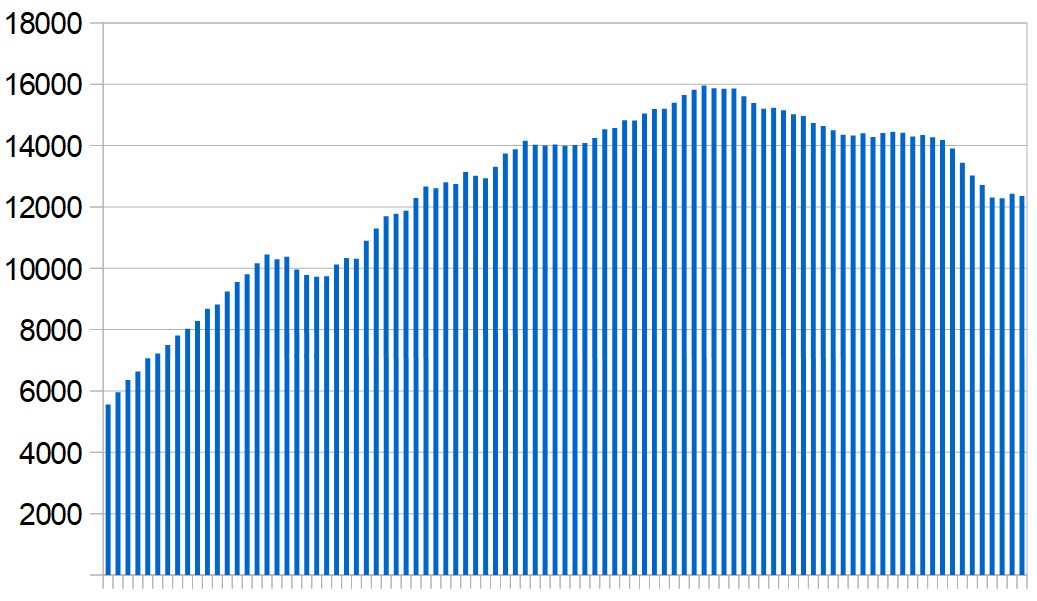 |
In the Middle East and North Africa the Covid-19 pandemic appears to be slowly subsiding. A month ago, new infections across the region were running at almost 16,000 a day. Since then, the seven-day daily average has fallen during each of the last four weeks and now stands at 12,357.
This week 12 of the 20 countries monitored have reported a lower number of new infections than in the week before. Egypt has seen a particularly sharp decrease according to the official figures.
That said, Iran and Iraq continue to report well over 2,000 new infections every day and show no real sign of improvement. Saudi Arabia and Israel also averaged more than 1,400 a day during the past week, though their numbers are declining.
Morocco had an especially bad week, while Lebanon and Syria also reported record numbers of new cases.
Detailed statistics for the region, based on official figures, can be found in this spreadsheet.
Previous situation reports: August 1; July 25; July 18; July 11; July 4; June 27; June 20.
ALGERIA
New infections in Algeria increased substantially in June and July, though the numbers have gone down slightly since then. Official figures show new cases averaged 537 a day during past week compared with 621 a day at the end of July.
A night curfew (8pm to 5am) in 29 wilayas (administrative districts) including the capital, Algiers, is expected to continue until August 12. Road traffic in and out of these districts is also restricted.
On Monday, President Abdelmadjid Tebboune said the government “is reviewing the possibility to reopen mosques, beaches and other places for recreation and relaxation for the public.” However, the authorities have stressed that this will not signal the end of the epidemic and precautions such as social distancing and wearing of masks will still be necessary.
Protests have been reported in Polisario-run camps in south-western Algeria. The protesters are said to be complaining about lack of compensation for lost income during the lockdown but also about corruption within the Polisario movement.
About 2,300 healthcare workers have been infected with Covid-19 in Algeria and 44 of them have died, according to the health minister. Testing capacity in Algeria is low – about 2,500 tests a day.
For more information see: Covid-19 in Algeria
Confirmed cases: 34,155
New cases in past week: 3,761
Active cases: 9,206
Deaths: 1,282
Tests carried out: (unknown)
BAHRAIN
Bahrain has more than 25,000 known cases per million inhabitants. This makes it the world's third most infected country after Qatar and French Guiana. However, Bahrain is also one of the world leaders in Covid-19 testing. So far, about half of its 1.7 million population have been tested.
The daily total of new cases fluctuates but the epidemic appears to be subsiding gradually. The number of people reported to be currently infected is around 2,800, compared with 5,700 at the peak in mid-June.
Cafes and restaurants remain closed but the authorities have announced plans for a phased reopening in September. The education ministry has also issued a circular to private schools setting out "procedures" for the new academic year.
Migrant workers account for a relatively high proportion of Covid-19 cases in Bahrain (discussion here).
For more information see: Covid-19 in Bahrain
Confirmed cases: 43,307
New cases in past week: 2,872
Active cases: 2,995
Deaths: 159
Tests carried out: 886,000
EGYPT
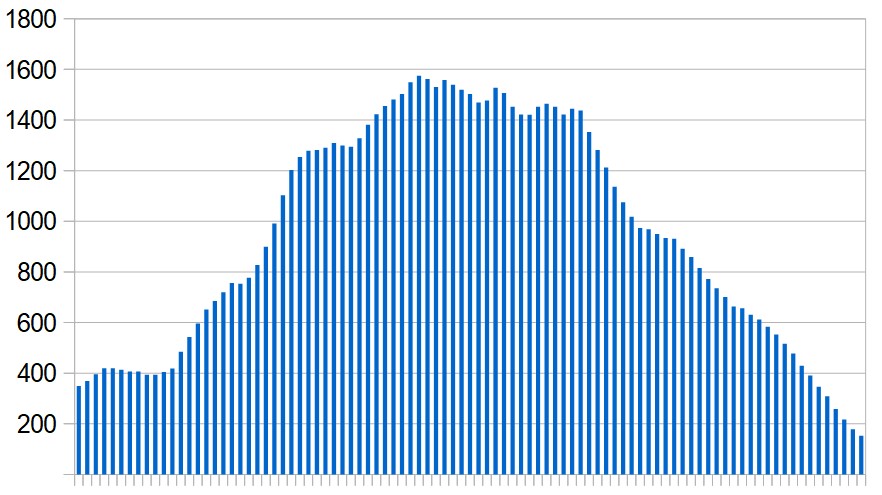 |
New cases peaked in June and have been falling sharply during the past few weeks, according to official figures. This week's average was 153 cases a day compared with almost 1,600 at the peak.
Although Egypt's official figures have often been viewed with suspicion there is other evidence that its outbreak is subsiding. For example, the health ministry has been closing down some of its temporary isolation facilities.
Egypt has been anxious to revive its economically important tourism sector and in July it began reopening its seaside resorts for foreign visitors. These resorts – in South Sinai, the Red Sea and Marsa Matrouh on the Mediterranean coast – have been isolated from the rest of the country to reduce the risk of infections spreading.
A report in Gulf News on Friday explained how this works. Foreigners flying directly to the resorts don't need to be tested for Covid-19 but they will need a test if they wish to leave the resort and visit other parts of the country. Foreigners arriving in other parts of the country must have tested negative during the 72 hours before travelling and will not be allowed to visit the resorts.
For more information see: Covid-19 in Egypt
Confirmed cases: 95,147
New cases in past week: 1,069
Active cases: 39,623
Deaths: 4,971
Tests carried out: 135,000
IRAN
Iran was the first country in the region to be seriously affected by the virus and its epidemic shows no sign of abating. Government figures show an initial wave of infections which peaked at the end of March. It subsided during April, briefly dipping below 1,000 new cases per day but then rose to a new peak in the first week of June.
New cases this week averaged 2,623 a day – the highest figure for two months.
Iran continues to report more coronavirus-related deaths than any other country in the region. A further 1,366 deaths have been recorded during the past week.
Confirmed cases: 322,567
New cases in past week: 18,363
Active cases: 24,711
Deaths: 18,132
Tests carried out: 2.6 million
IRAQ
Iraq is currently recording more new infections than any other country in the region. New cases this week averaged 2,779 a day. Worse still, Iraq's official figures are widely believed to understate the scale of the epidemic. Many cases go unreported because of social stigma. Compliance with preventive measures appears to be low and health services are inadequate.
For more information see: Covid-19 in Iraq
Confirmed cases: 144,064
New cases in past week: 19,455
Active cases: 35,631
Deaths: 5,236
Tests carried out: 1.1 million
ISRAEL
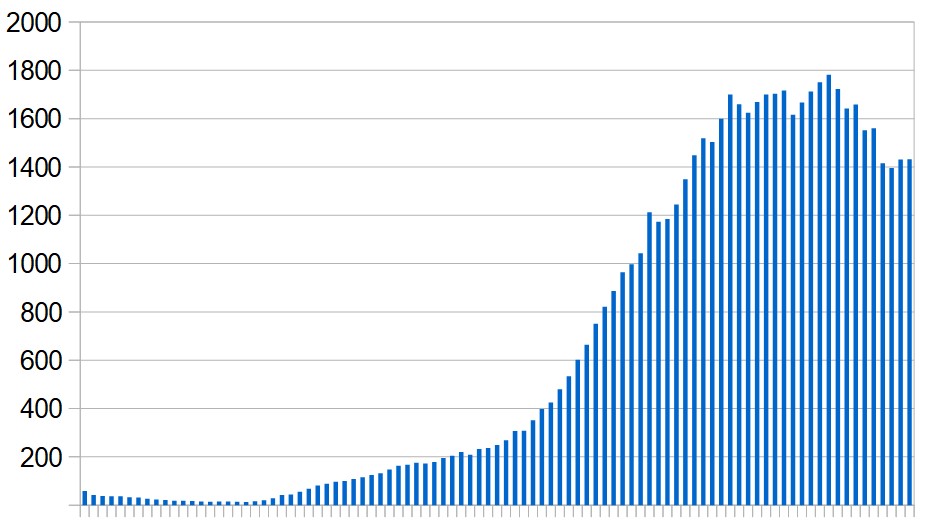 |
After coming close to bringing the epidemic under control, Israel has been hit by a second wave much larger than the first. More than 80,000 people have now tested positive for Covid-19 – most of them during the past month.
The first wave peaked at around 600 new cases a day in early April. Efforts to control it were intially successful and by the second half of May new cases had dropped to about 15 a day.
However, the virus surged back when lockdown restrictions were lifted and by the end of July new cases were averaging almost 1,800 a day. The second wave now appears to have peaked and new cases this week averaged 1,432 a day.
The authorities have been trying to avoid a second nationwide lockdown and have been imposing restrictions at weekends instead. On Thursday the government decided to cancel the restrictions planned for this weekend.
Despite the decline in new infections, there is concern about the number of seriously ill patients – currently 374, with 151 on ventilators. Several hospitals are reported to be full.
For more information see: Covid-19 in Israel
Confirmed cases: 80,991
New cases in past week: 10,021
Active cases: 25,097
Deaths: 581
Tests carried out: 1.9 million
JORDAN
Jordan has been one of the most successful Arab countries in controlling the virus. A few new cases are still being recorded but almost all of them are among people who were quarantined after arriving from other countries.
The government had previously announced that airports would resume normal business on August 5 but that has been postponed at least until August 18. In the meantime they are open for Jordanian citizens to leave or return. The delay is said to be due to difficulties in deciding which countries to include on the low-risk list.
For more information see: Covid-19 in Jordan
Confirmed cases: 1,237
New cases in past week: 44
Active cases: 48
Deaths: 11
Tests carried out: 634,000
KUWAIT
New infections peaked in late May at just over 1,000 cases a day. The numbers have dropped back substantially since then and new cases averaged 670 a day during July. This week's average has been lower still – 539 cases a day.
Problems over repatriation flights for Indian expatriates in Kuwait appear to have been resolved. According to media reports, agreement has been reached for 1,000 Indians to be flown home every day between August 10 and October 24.
For more information see: Covid-19 in Kuwait
Confirmed cases: 70,727
New cases in past week: 3,770
Active cases: 7,926
Deaths: 471
Tests carried out: 526,000
LEBANON
Lebanon is in the midst of political and economic chaos, and this week has been more preoccupied by the catastrophic explosion in Beirut than coronavirus.
Although Lebanon's outbreak is still relatively small, infections have surged during the past month. New cases this week averaged 199 a day – the highest level so far.
For more information see: Covid-19 in Lebanon
Confirmed cases: 5,951
New cases in past week: 1,396
Active cases: 3,839
Deaths: 70
Tests carried out: 353,000
LIBYA
Libya is in its ninth year of internal conflict. The UN-backed Government of National Unity in Tripoli is challenged by Field Marshall Haftar's forces based in the east of the country. There are also numerous militias.
This leaves the country ill-equipped to cope with a major epidemic. Growing levels of insecurity, political fragmentation and weak governance have led to a deterioration of basic services, particularly in the health system. At least 27 health facilities have been damaged or closed by fighting and some have been attacked directly. The number of confirmed infections is still small but testing is very limited. There are 870,000 people – refugees, asylum seekers and displaced persons – who the UN regards as especially vulnerable.
The World Health Organisation (WHO) describes the coronavirus situation in Libya as "clusters of cases" – in other words, a series of local outbreaks rather than a generalised epidemic. Sebha, Tripoli, Zliten, Misrata, Ashshatti, Ubari, Traghen, Janzour and Khoms are said to be particular hotspots.
According to the WHO, most Covid-19 cases are centred around Sebha, an oasis city 400 miles south of Tripoli. Sebha is close to the borders with Niger, Chad and Algeria, and is a major hub on the migration route from Africa to Europe. It currently hosts about 40,000 migrants. A Swiss-based organisation, REACH, has issued a detailed report on the situation there.
For more information see: Covid-19 in Libya
Confirmed cases: 5,079
New cases in past week: 1,458
Active cases: 4,311
Deaths: 108
Tests carried out: 61,000
MOROCCO
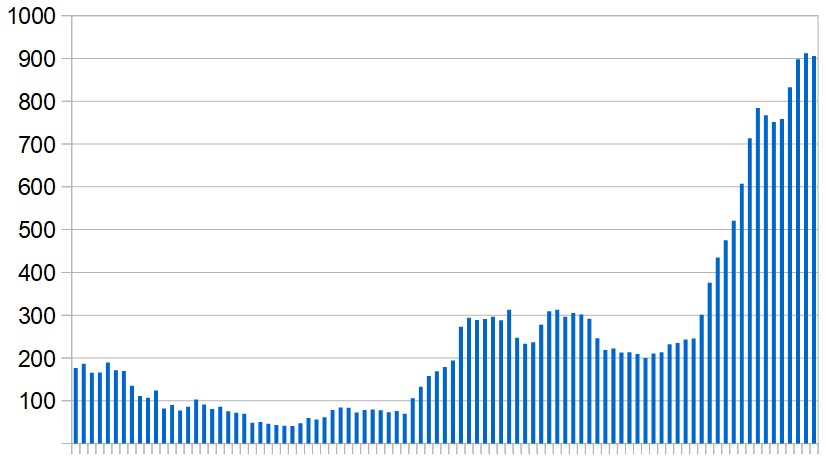 |
Morocco has experienced its worst week so far, with a record 1,283 new cases reported on Wednesday. The number of deaths and critically-ill patients is also increasing.
Initially, Morocco had some success in containing the virus and by early June, as a result of its strict lockdown, new cases had fallen to around 40 a day. However, there have been steep increases since then. Although some restrictions have been eased eight major cities remain under lockdown.
A health ministry briefing earlier this week is reported here, along with a map showing the areas most affected. On Thursday prime minister Saad Eddine El Othmani described the situation as worrying and called on everyone to adhere to preventive measures. "Responsibility is individual and collective," he said.
Wearing of face masks is compulsory in public but compliance appears to be declining, partly as a result of the hot weather. The government hopes to increase compliance by "simplifying the procedures for collecting fines from violators". The current penalties are a fine ranging from $29 to $129 and/or one to three months in jail.
According to the nurses' union 118 health workers have been infected since the outbreak began.
For more information see: Covid-19 in Morocco
Confirmed cases: 30,662
New cases in past week: 6,340
Active cases: 8,653
Deaths: 461
Tests carried out: 1.4 million
OMAN
New infections peaked in mid-July with just under 1,600 cases a day but are now on a downward path. New cases averaged 273 a day this week – a substantial drop to levels not seen since mid-May.
However, the health ministry stopped reporting for several days during the Eid al-Adha holiday and it's possible that some of the decrease is the result of less testing.
The night curfew is due to be shortened by three hours from today and will run from 9pm to 5am. Restrictions on movement between the various governorates are also being lifted but the Dhofar region will remain under lockdown.
More than 600 medical staff in Oman have been infected with Covid-19 since the outbreak began, according to the government.
For more information see: Covid-19 in Oman
Confirmed cases: 81,067
New cases in past week: 1,908
Active cases: 7,367
Deaths: 509
Tests carried out: 309,000
PALESTINE
Palestine, like Israel, is in the midst of a wave of new infections. Almost 18,000 cases have been recorded since the outbreak began – more than two-thirds of them during the past month. Hebron is the most seriously affected area, with 8,845 confirmed cases.
Many of the recent infections are attributed to people ignoring the rules for social distancing, which the authorities have difficulty enforcing. The health ministry says more than 30% of cases are the result of Palestinians travelling to and from work in Israel which is in the second wave of its epidemic.
Fears of a major outbreak in Gaza have not materialised. Most of the known cases there appear to have been due to contacts with Egypt.
For more information see: Covid-19 in Palestine
Confirmed cases: 17,948 (West Bank 13,644, Gaza 78, East Jerusalem 4,226)
New cases in past week: 2,716
Active cases: 6,418
Deaths: 97
Tests carried out: 200,000
QATAR
In population terms Qatar has more known cases than any other country – 39,000 per million inhabitants. Migrant workers have been disproportionately affected. Qatar's epidemic reached a peak in the first week of June but infections have fallen steadily since then. During the past week new cases averaged 241 a day, compared with more than 1,800 a day at the peak.
For more information see: Covid-19 in Qatar
Confirmed cases: 112,383
New cases in past week: 1,688
Active cases: 3,061
Deaths: 180
Tests carried out: 514,000
SAUDI ARABIA
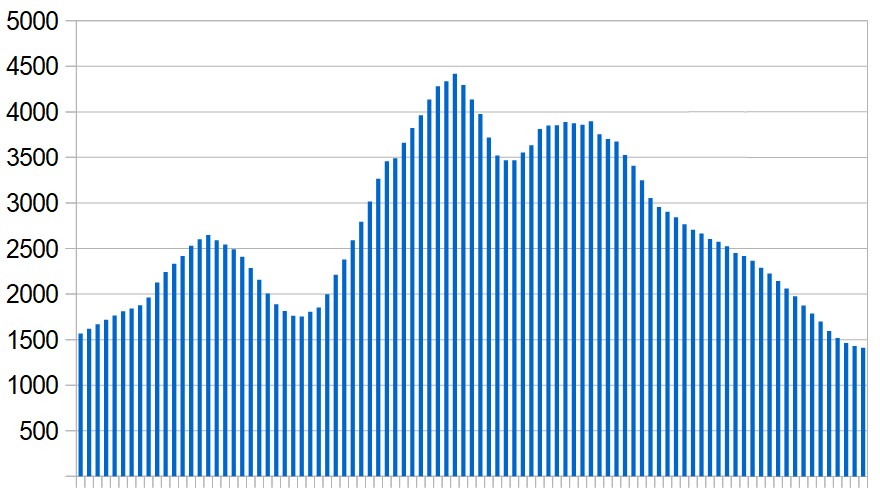 |
Saudi Arabia has the largest number of recorded cases among the Arab countries. New infections reached an initial peak in the fourth week of May, then dropped back slightly before rising to a higher peak in the third week of June. Since then, though, there has been a substantial improvement.
Numbers of new cases are still large but they have been on a steady downward path for the past month. This week's average was 1,413 a day – about 3,000 a day below the June peak. The kingdom currently has about 34,000 active cases compared with more than 63,000 at the peak.
Migrant workers have been disproportionately affected but the authorities have also complained about non-compliance with precautionary measures by Saudi citizens.
For more information see: Covid-19 in Saudi Arabia
Confirmed cases: 285,793
New cases in past week: 9,888
Active cases: 33,752
Deaths: 3,093
Tests carried out: 3.7 million
SUDAN
The coronavirus struck Sudan in the midst of a political transition following a popular uprising against the regime of President Bashir and the country is ill-equipped to cope with a major epidemic. Testing is very limited and official figures don't reflect the full scale of the outbreak.
For more information see: Covid-19 in Sudan
Confirmed cases: 11,894
New cases in past week: 250
Active cases: 4,878
Deaths: 773
Tests carried out: (unknown)
SYRIA
Syria reported 61 new Covid-19 infections on Friday – its highest daily total so far. Although official figures suggets Syria's outbreak is still small, with just over 1,000 cases reported in areas controlled by the Assad regime, it is growing steadily.
Official announcements rarely give any details and this lack of transparency fuels suspicions that many cases are being concealed. There is also some evidence that people with Covid-19 symptoms are reluctant to contact the authorities.
A report on the Syria in Context website, based largely on anecdotal evidence, suggests there are large numbers of cases which have not been recorded.
Fears have been raised about north-western and north-eastern parts of the country which are outside the regime's control. Millions of displaced people are living in those areas and health services are often rudimentary. A further 11 cases have been confirmed in the north-west since last week's update, bringing the total there to 40. In the north-east, 17 new cases have brought the total to 36.
For more information see: Covid-19 in Syria
The following figures relate to regime-controlled areas only:
Confirmed cases: 1,060
New cases in past week: 303
Active cases: 701
Deaths: 48
Tests carried out: (unknown)
TUNISIA
At present there is little transmission of the virus inside Tunisia. The head of the National Observatory of New and Emerging Diseases told a news conference this week that since Tunisia reopened its borders on June 27 a total of 346 Covid-19 cases have been detected among people entering the country, while only 66 local cases have been recorded.
New cases during the past week (including arrivals from abroad) averaged 17 a day.
For more information see: Covid-19 in Tunisia
Confirmed cases: 1,656
New cases in past week: 121
Active cases: 354
Deaths: 51
Tests carried out: 100,000
UNITED ARAB EMIRATES
The UAE's epidemic peaked in the last week of May when new infections were running at more than 900 a day. New cases this week have averaged 222 a day – the lowest level for four months. However, infections have increased recently among Emirati citizens (as opposed to expatriates), according to health minister Abdul Rahman al-Owais. Speaking on Thursday he said some citizens have "become lax in following prevention measures and not adhering to safety and physical distancing rules in gatherings and during social visits".
The UAE has carried out more tests per head of population than any other Arab country and ranks sixth worldwide in terms of levels of testing.
As a result of the pandemic large numbers of expatriate workers have been returning home from the Gulf states. The Air India jet that crashed on landing at Calicut airport on Friday killing 18 people was one of the repatriation flights from Dubai.
For more information see: Covid-19 in the UAE
Confirmed cases: 62,061
New cases in past week: 1,555
Active cases: 5,690
Deaths: 356
Tests carried out: 5.4 million
YEMEN
Because of the ongoing war, Yemen already faced a humanitarian crisis before the coronavirus arrived. Millions are malnourished and vulnerable to disease, and health services are inadequate. Official figures grossly understate the severity of the epidemic.
The aid organisation Médecins Sans Frontières (MSF), which is active in Yemen, said this week:
"The country’s national health system – already pushed to the brink of collapse by years of devastating conflict – is struggling to respond to the pandemic.
"There is no money to pay health staff, and personal protective equipment and COVID-19 tests are hard to come by. To make matters worse, misinformation about the virus is fueling fear and stigma, causing many sick people to avoid seeking medical care until it’s too late, compounding already high mortality rates."
On Thursday MSF held an online panel discussion about the situation (video here, transcript here).
For more information see: Covid-19 in Yemen
Confirmed cases: 1,800
New cases in past week: 68
Active cases: 377
Deaths: 513
Tests carried out: (unknown)

 RSS Feed
RSS Feed
